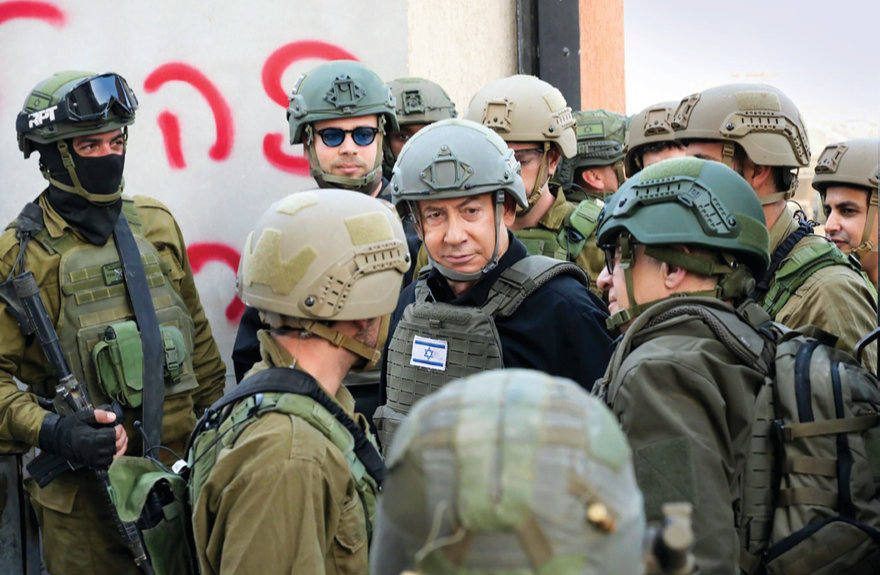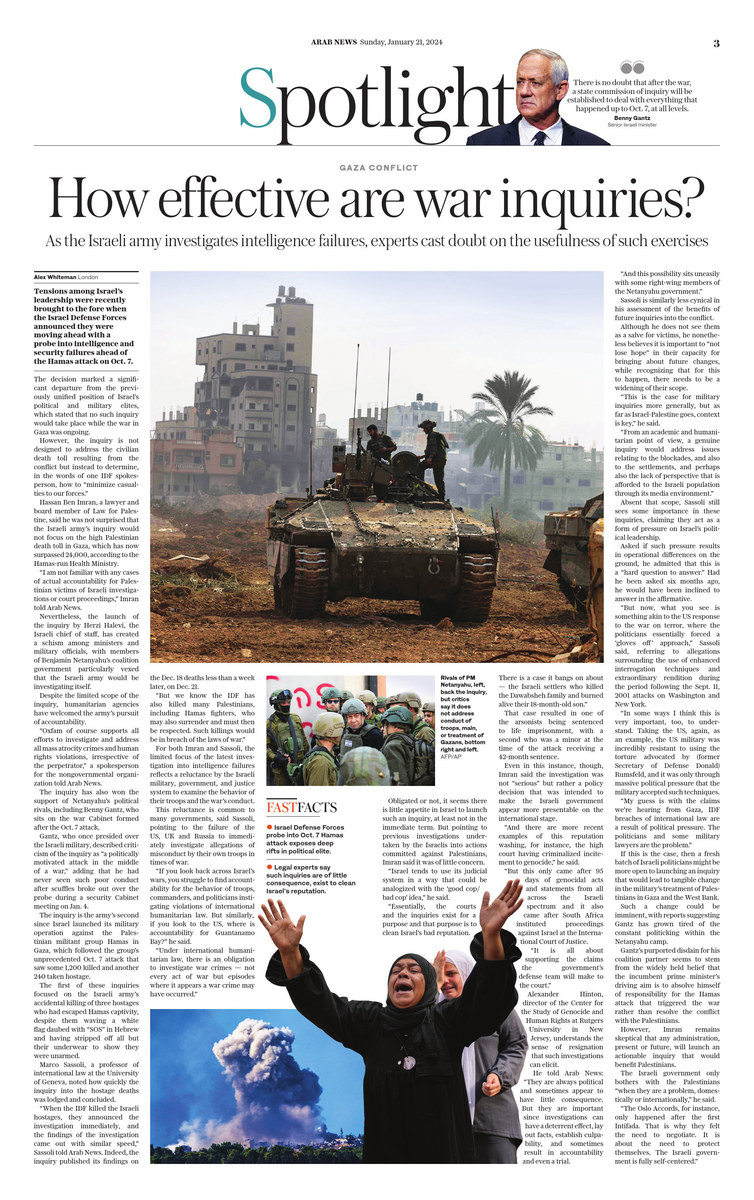LONDON: Tensions among Israel’s leadership were recently brought to the fore when the Israel Defense Forces announced they were moving ahead with a probe into intelligence and security failures ahead of the Hamas attack on Oct. 7.
The decision marked a significant departure from the previously unified position of Israel’s political and military elites, which stated that no such inquiry would take place while the war in Gaza was ongoing.
However, the inquiry is not designed to address the civilian death toll resulting from the conflict but instead to determine, in the words of one IDF spokesperson, how to “minimize casualties to our forces.”
Hassan Ben Imran, a lawyer and board member of Law for Palestine, said he was not surprised that the Israeli army’s inquiry would not focus on the high Palestinian death toll in Gaza, which has now surpassed 24,000, according to the Hamas-run health ministry.
“I am not familiar with any cases of actual accountability for Palestinian victims of Israeli investigations or court proceedings,” Imran told Arab News.
Nevertheless, the launch of the inquiry by Herzi Halevi, the Israeli chief of staff, has created a schism among ministers and military officials, with members of Benjamin Netanyahu’s coalition government particularly vexed that the Israeli army would be investigating itself.

Despite the limited scope of the inquiry, humanitarian agencies have welcomed the army’s pursuit of accountability.
“Oxfam of course supports all efforts to investigate and address all mass atrocity crimes and human rights violations, irrespective of the perpetrator,” a spokesperson for the nongovernmental organization told Arab News.
The inquiry has also won the support of Netanyahu’s political rivals, including Benny Gantz, who sits on the war cabinet formed after the Oct. 7 attack.
Gantz, who once presided over the Israeli military, described criticism of the inquiry as “a politically motivated attack in the middle of a war,” adding that he had never seen such poor conduct after scuffles broke out over the probe during a security cabinet meeting on Jan. 4.
The inquiry is the army’s second since Israel launched its military operation against the Palestinian militant group Hamas is Gaza, which followed the group’s unprecedented Oct. 7 attack that saw some 1,200 killed and another 240 taken hostage.
The first of these inquiries focused on the Israeli army’s accidental killing of three hostages who had escaped Hamas captivity, despite them waving a white flag daubed with “SOS” in Hebrew and having stripped off all but their underwear to show they were unarmed.
Marco Sassoli, a professor of international law at the University of Geneva, noted how quickly the inquiry into the hostage deaths was lodged and concluded.
“When the IDF killed the Israeli hostages, they announced the investigation immediately, and the findings of the investigation came out with similar speed,” Sassoli told Arab News. Indeed, the inquiry published its findings on the Dec. 18 deaths less than a week later, on Dec. 21.
“But we know the IDF has also killed many Palestinians, including Hamas fighters, who may also surrender and must then be respected. Such killings would be in breach of the laws of war.”
For both Imran and Sassoli, the limited focus of the latest investigation into intelligence failures reflects a reluctance by the Israeli military, government, and justice system to examine the behavior of their troops and the war’s conduct.
This reluctance is common to many governments, said Sassoli, pointing to the failure of the US, UK and Russia to immediately investigate allegations of misconduct by their own troops in times of war.
“If you look back across Israel’s wars, you struggle to find accountability for the behavior of troops, commanders, and politicians instigating violations of international humanitarian law. But similarly, if you look to the US, where is accountability for Guantanamo Bay?” he said.
“Under international humanitarian law, there is an obligation to investigate war crimes — not every act of war but episodes where it appears a war crime may have occurred.”
Obligated or not, it seems there is little appetite in Israel to launch such an inquiry, at least not in the immediate term. But pointing to previous investigations undertaken by the Israelis into actions committed against Palestinians, Imran said it was of little concern.
“Israel tends to use its judicial system in a way that could be analogized with the ‘good cop/bad cop’ idea,” he said.
“Essentially, the courts and the inquiries exist for a purpose and that purpose is to clean Israel’s bad reputation. There is a case it bangs on about — the Israeli settlers who killed the Dawabsheh family and burned alive their 18-month-old son.”
That case resulted in one of the arsonists being sentenced to life imprisonment, with a second who was a minor at the time of the attack receiving a 42-month sentence.
Even in this instance, though, Imran said the investigation was not “serious” but rather a policy decision that was intended to make the Israeli government appear more presentable on the international stage.
“And there are more recent examples of this reputation washing, for instance, the high court having criminalized incitement to genocide,” he said.
“But this only came after 95 days of genocidal acts and statements from all across the Israeli spectrum and it also came after South Africa instituted proceedings against Israel at the International Court of Justice.
“It is all about supporting the claims the government’s defense team will make to the court.”
Alexander Hinton, director of the Center for the Study of Genocide and Human Rights at Rutgers University in New Jersey, understands the sense of resignation that such investigations can elicit.
He told Arab News: “They are always political and sometimes appear to have little consequence. But they are important since investigations can have a deterrent effect, lay out facts, establish culpability, and sometimes result in accountability and even a trial.
“And this possibility sits uneasily with some right-wing members of the Netanyahu government.”
Sassoli is similarly less cynical in his assessment of the benefits of future inquiries into the conflict.
Although he does not see them as a salve for victims, he nonetheless believes it is important to “not lose hope” in their capacity for bringing about future changes, while recognizing that for this to happen, there needs to be a widening of their scope.
“This is the case for military inquiries more generally, but as far as Israel-Palestine goes, context is key,” he said.
“From an academic and humanitarian point of view, a genuine inquiry would address issues relating to the blockades, and also to the settlements, and perhaps also the lack of perspective that is afforded to the Israeli population through its media environment.”
Absent that scope, Sassoli still sees some importance in these inquiries, claiming they act as a form of pressure on Israel’s political leadership.
Asked if such pressure results in operational differences on the ground, he admitted that this is a “hard question to answer.” Had he been asked six months ago, he would have been inclined to answer in the affirmative.
“But now, what you see is something akin to the US response to the war on terror, where the politicians essentially forced a ‘gloves off’ approach,” Sassoli said, referring to allegations surrounding the use of enhanced interrogation techniques and extraordinary rendition during the period following the Sept. 11, 2001 attacks on Washington and New York.
“In some ways I think this is very important, too, to understand. Taking the US, again, as an example, the US military was incredibly resistant to using the torture advocated by (former Secretary of Defense Donald) Rumsfeld, and it was only through massive political pressure that the military accepted such techniques.
“My guess is with the claims we’re hearing from Gaza, IDF breaches of international law are a result of political pressure. The politicians and some military lawyers are the problem.”
If this is the case, then a fresh batch of Israeli politicians might be more open to launching an inquiry that would lead to tangible change in the military’s treatment of Palestinians in Gaza and the West Bank.
Such a change could be imminent, with reports suggesting Gantz has grown tired of the constant politicking within the Netanyahu camp.
Gantz’s purported disdain for his coalition partner seems to stem from the widely held belief that the incumbent prime minister’s driving aim is to absolve himself of responsibility for the Hamas attack that triggered the war rather than resolve the conflict with the Palestinians.
However, Imran remains skeptical that any administration, present or future, will launch an actionable inquiry that would benefit Palestinians.
The Israeli government only bothers with the Palestinians “when they are a problem, domestically or internationally,” he said.
“The Oslo Accords, for instance, only happened after the first Intifada. That is why they felt the need to negotiate. It is about the need to protect themselves. The Israeli government is fully self-centered.”











